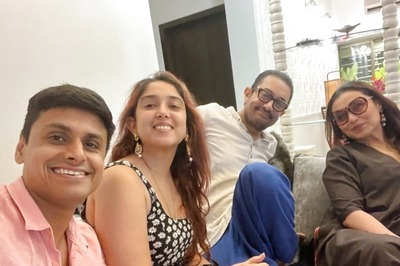
views
Chandigarh: Fault lines have appeared in the decades-old ties between the Shiromani Akali Dal (SAD) and Bharatiya Janata Party (BJP).
The discord this time has religious roots which potentially may prove to be the last straw with the SAD accusing the BJP of meddling in the affairs of its religious bodies.
The origins of this latest conflict revolves around the 2015 amendment in the Takht Sri Hazur Abchalnagar Sahib Board Nanded Act, 1956, brought about by Maharashtra’s BJP government.
The change grants the Maharashtra government the right to appoint the president of the managing committee of the Takht Sri Hazur Sahib.
Nanded Sahib or the Takht Sri Hazur Sahib is one of the five Takhts, temporal seats, held in high reverence by Sikhs as the 10th Sikh master Guru Gobind breathed his last here.
The controversy erupted after Jathedar of Shri Hazur Sahib, Kulwant Singh, passed a resolution demanding that the amendment be revoked.
The issue was soon taken up by the SAD with Delhi Sikh Gurdwara Management Committee general secretary Manjinder Singh Sirsa threatening to severe ties with the BJP “if the government does not stop interference in gurdwaras”.
Sirsa was joined in by Shiromani Gurdwara Prabandhak Committee (SGPC) president Gobind Singh Longowal who accused the BJP of “political interference in religious matters”.
Talking to News 18, Longowal said, “Members to the managing committee of the Takht Sri Hazur Sahib have always been chosen by the sangat (group of people who meet, especially in the presence of the Guru Granth Sahib) and they in turn chose the president. This is very distressing and painful that the Maharashtra government is meddling into the affairs of Shri Hazur Sahib. By amending the 1956 Act, they are appointing an RSS-minded Sikh as president of the board. The SGPC has written to the Prime Minister and Maharashtra chief minister seeking an end to this interference. I believe the intentions behind this move are not good. The Rashtriya Swayamsewak Sangh (RSS) wants to control our shrines”.
Longowal was clearly pointing out at the Rashtriya Sikh Sangat, an RSS affiliate, which lashed out at the SAD accusing it of misusing the Sikh shrines for political gains.
Reacting to Sirsa’s allegations, Rashtriya Sikh Sangat general secretary Avtar Singh Shastri said, “Discussing or working on Sikh issues is not the sole right of the SAD. Akali Dal has always used our religious places for political gains. It is well known how the SAD granted pardon to the Dera Sacha Sauda chief, Gurmeet Ram Rahim”.
“Sirsa has no right to speak against the BJP while being a party MLA himself. The Maharashtra government has taken a decision within the limits of the law. Akali Dal is pained at the fact it will now longer be able to use the Takht Sabib for its political gains,” Shastri added.
Meanwhile, Punjab BJP president Shwait Malik recused himself from making a statement saying it was up to the BJP and SAD presidents to deliberate upon the issue.
Even as the tension between the two traditional allies ebbed, the SAD preferred to skip the NDA meet before the beginning of the Budget session of Parliament.
Until 2015, 17 board members used to directly elect the president of the Gurudwara Sachkhand Board Nanded which looks after the management of the Takht Hazur Sahib Board.
But after the amendment was made to the Section 11 of the Takht Sri Hazur Abchalnagar Sahib Board Nanded Act, 1956, the government gave itself the right to appoint the board president.
Subsequently, BJP MLA Tara Singh was appointed the board’s president in 2015. He completed his tenure in October 2018 and is continuing as an officiating president.
The Maharashtra government has this time proposed the name of Mumbai industrialist Bhupinder Singh Minhas’s name for the post. Minhas is reported to be close to the RSS which has led to resistance from the SAD-affiliated members.
If one is to take a sneak-peek into history, it comes to the fore that control over Sikh religious bodies is from where the Shiromani Akali Dal draws its power.
The SAD exercises tremendous clout over the Shiromani Gurdwara Prabandhak Committee (SGPC) which manages the affairs of 200-odd Gurdwaras in Punjab, Haryana and Himachal, and the Delhi Sikh Gurdwara Management Committee (DSGMC) in Delhi.
It owes its birth as a political organisation to the Sikh movement for control over its religious institutions during the British rule in India.
The SAD came into existence in December 1920 following the Akali (worshipper of the eternal God) movement which was launched to take control of management of gurdwaras.
The major achievement of this movement was the creation of a central management committee, the Shiromani Gurdwara Prabandhak Committee (SGPC) to look after the gurdwaras.
The historical association of the Akali Dal with the founding of this committee has had a long-term impact on the public image and perception of Akali Dal as an organisation primarily concerned with politics of religious issues concerning the Sikhs.
With the Rashtriya Sikh Sangat entering the scene, the SAD is seemingly perturbed about losing its constituency.




















Comments
0 comment